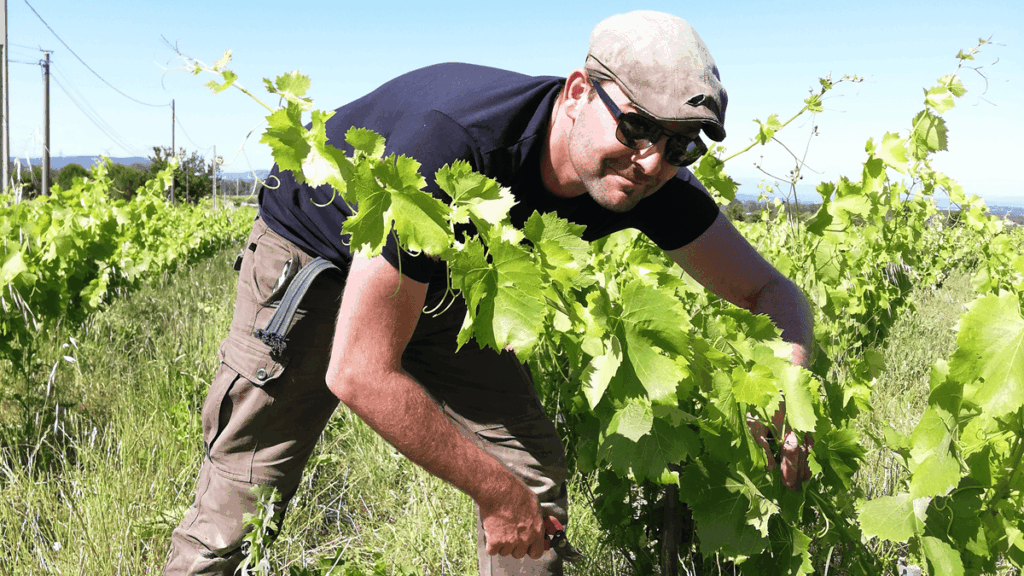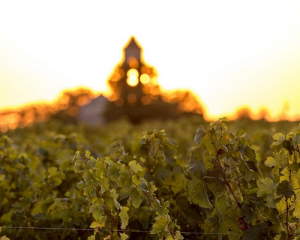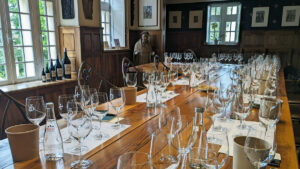
Working in Tavel and Lirac, Romain Le Bars stands out as a new and committed voice in the Rhône Valley wine region. Born in Paris and trained by leading figures from the natural wine scene, he opted to leave city life behind to cultivate 11 hectares of vines with organic methods and an artisanal approach respectful of the living.
From Montmartre to rolled pebbles
In the iconic rosé appellations of Tavel and Lirac, a new name is quietly asserting itself with steady, quiet energy – Romain Le Bars. The son of a Parisian bistro owner, Romain was already convinced of the merits of ‘natural’ wines as early as the 1990s and started his career as a waiter in Montmartre before taking a radical turn. Graduating with a Professional Certificate in Agricultural Management (BPRA), he initially trained with Jean Foillard, a leading figure in natural Beaujolais wine. He then spent seven formative years learning from Éric Pfifferling at Domaine de L’Anglore. Both mentors remain a source of inspiration for him today.
Both experiences confirmed a deep-seated conviction of his: wine can be made without additives, with respect, patience and commitment. Gradually, Romain distanced himself from city life, forging a closer connection with the living, the land and wine. In 2018, he started with a single hectare, leasing the land. By 2019, he had expanded to 10 hectares, now totalling 11 hectares with 3.5 hectares in Tavel AOP , 3.5 in Lirac AOP, and 4.5 under the Vin de France designation. Settled in Tavel with his partner Eugénie, Romain is part of a new generation of winemakers bringing fresh energy to the Rhône Valley.
At the pace of the vines

Romain Le Bars’ estate achieved organic certification in July 2021, and the winemaker is now carefully experimenting with biodynamic methods. His vineyard work reflects the constant attention he pays to both the soil and the plants: sowing peas to naturally give nitrogen to the soil, regular soil decompacting, earthing-up and hoeing. Of the 11 hectares, three are trained using the goblet method (forming four arms around a central base to distribute and aerate the clusters), and Romain plans to gradually expand staked vine training. A controlled grass cover is maintained between every other row. As for grape varieties, the estate cultivates Grenache, Mourvèdre, Cinsault, Syrah and Carignan for the reds, and Roussanne, Clairette and Ugni Blanc for the whites. One hectare of olive trees will eventually be planted to enrich the biodiversity of the property. All work is done by hand, using traditional methods that respect the natural rhythm of the vines.
Carbonic maceration – His signature approach
Romain embraces a “natural wine” approach, with no additives, except for a minimal dose of sulphur at bottling (15 mg/L total SO₂). Harvesting is always done by hand, starting early (around 20–25 August) to preserve freshness and moderate alcohol levels.
The winemaking process relies primarily on carbonic maceration – a method inherited from Beaujolais but adapted to southern terroirs – for both rosé and red wines. The whites are vinified by direct pressing, followed by cold settling, and then ferment on their lees in wooden barrels, with malolactic fermentation triggered naturally.
The wines are left to age from September to April, often in casks, and pair well with gourmet cuisine as well as summer barbecues. Perfect for your bright, sun-drenched meals!
His wines for sale on iDealwine
- Tavel, a wine that combines aromatic finesse with indulgent fruit, this rosé which pairs wonderfully with food can be enjoyed now or cellared for a few years.
- Lirac, a cask-aged rosé with no woody heaviness, delivering a perfect harmony of freshness, red fruit and citrus in a finely poised balance.
- Vin de France Nouveau Nez, crafted using carbonic maceration, this early-bottled wine is bursting with juicy strawberry and redcurrant flavours, carried by a crisp, vibrant palate.
- Vin de France Nuits de Java, a unique blend of Tavel Rouge and Grenache Blanc grown on sandy and limestone soils. Its pale hue reveals aromas of citrus and red fruit, along with a fresh, light, lively palate. Best served lightly chilled.
- Vin de France Les Vestides, mostly made from Cinsault grapes, aged for 10 months in casks following carbonic maceration, this red wine offers fresh aromas of wild strawberry with a crisp, juicy and light palate. Perfect served chilled.



